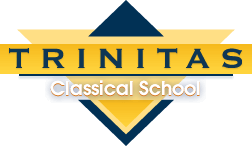“When love and skill mingle, expect a masterpiece.” — John Ruskin
The curriculum at Trinitas fits beautifully within the classical model. We have created a program of study which equips students with the essential tools of learning, familiarizes them with classic works and important events, and is highly engaging. As teachers and parents, we are committed to helping students cultivate a life-long love of learning, to helping them discover, discern, and desire truth.
Worship, Bible, and Character Education
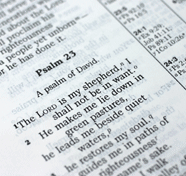 Each morning, Trinitas students and teachers gather for morning prayer; they read Scripture and sing together. Parents and siblings are always welcome to attend. Our Bible curriculum teaches students salvation history and inspires them with stories of heroes of the faith. Each week students memorize Scripture passages which accompany the stories being told. Trinitas students are taught the skills necessary for self-discipline through intentional character instruction (our headmaster likes to refer to these skills as “the lost tools of living”).
Each morning, Trinitas students and teachers gather for morning prayer; they read Scripture and sing together. Parents and siblings are always welcome to attend. Our Bible curriculum teaches students salvation history and inspires them with stories of heroes of the faith. Each week students memorize Scripture passages which accompany the stories being told. Trinitas students are taught the skills necessary for self-discipline through intentional character instruction (our headmaster likes to refer to these skills as “the lost tools of living”).
Language Arts
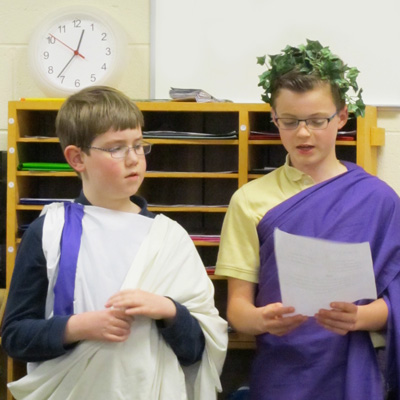 At Trinitas, we desire that our students not only read well but also that they be well-read. To this end, we employ an excellent phonics-based reading program in grades K through two and a literature-based reading program in grades two through four. Students in grades five through eight are guided through classic works of literature and poetry by a master teacher.
At Trinitas, we desire that our students not only read well but also that they be well-read. To this end, we employ an excellent phonics-based reading program in grades K through two and a literature-based reading program in grades two through four. Students in grades five through eight are guided through classic works of literature and poetry by a master teacher.
Literature selections, both those assigned in class and read aloud by the teachers, are made from a list of classic texts and are often integrated into the history curriculum. For a list of books read at Trinitas, consult our reading list.
One mark of a well-educated person is the ability to write well. The only way to learn to write well is to practice, practice, practice. Trinitas students begin an intensive study of English grammar in the 1st grade combined with frequent pre-writing and writing exercises, both expository and creative. Outside reading and writing are encouraged through voluntary participation in the Trinitas Thoughtful Reader book clubs, Reader’s Theater, and the Trinitas Young Authors Festival.
History
“Most of all, perhaps, we need intimate knowledge of the past.” —C.S. Lewis
Tell a child a story and he will be able to retell it in astonishing detail. Because stories naturally capture the imagination of the child, Trinitas students don’t simply memorize lists of dates and events, they read a well-written and engaging narrative of world history together with historical fiction and select primary sources. Giving oral review presentations, creating time-lines, writing and illustrating their own set of history cards, and hands-on projects are just some additional ways students at Trinitas gain an intimate knowledge of the past. Such knowledge fosters a deeper understanding of the present and a fuller perspective of the future.
Latin and Greek
“I will say at once, quite firmly, that the best grounding for education is the Latin grammar. I say this not because Latin is traditional and medieval, but simply because even a rudimentary knowledge of Latin cuts down the labor and pains of learning almost any other subject by at least fifty percent.” — Dorothy Sayers
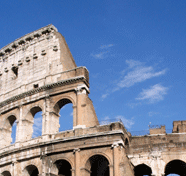 We believe that the best time to being the study of languages is when a child is young. Trinitas students begin Latin in first grade with the introduction of songs and vocabulary; this continues through the second grade. Third through fifth graders are engaged in a more rigorous study of the language using a curriculm that is integrated with our English grammar curriculum. Trinitas sixth through eighth graders use a high school-level Latin text.
We believe that the best time to being the study of languages is when a child is young. Trinitas students begin Latin in first grade with the introduction of songs and vocabulary; this continues through the second grade. Third through fifth graders are engaged in a more rigorous study of the language using a curriculm that is integrated with our English grammar curriculum. Trinitas sixth through eighth graders use a high school-level Latin text.
Classical Greek begins in the seventh grade. Our graduates have found that their Latin and Greek backgrounds provide considerable advantages when, for example, studying other languages, taking college entrance exams, and encountering unfamiliar vocabulary and scientific terminology.
Math, Science, and Logic
 Trinitas uses the Primary Mathematics series (otherwise known as Singapore math). This curriculum not only teaches students math; it teaches them to think mathematically and prepares them well for the next stages of the Trivium. Singapore math has produced impressive results in international testing and was found in pilot studies not only to improve student performance in math but also to increase their enthusiasm and confidence. We have found this to be true at Trinitas as well.
Trinitas uses the Primary Mathematics series (otherwise known as Singapore math). This curriculum not only teaches students math; it teaches them to think mathematically and prepares them well for the next stages of the Trivium. Singapore math has produced impressive results in international testing and was found in pilot studies not only to improve student performance in math but also to increase their enthusiasm and confidence. We have found this to be true at Trinitas as well.
Our science curriculum (FOSS) is one of three recommended by the National Science Resources Center, the National Academy of Sciences, and the Smithsonian Institution as meeting their criteria for “an exemplary elementary science program.” Trinitas students don’t just learn about science, they do it. FOSS is not a piece-meal approach to a science program; it is a coherent, well-thought out curriculum carefully designed to fit the development of the students as they progress through the grade levels. We think it works well with the stages of the Trivium.
Critical thinking is taught beginning in third grade. The students move to a more formal study of logic in grades five through eight when they learn to identify fallacies, hone their skills in debate, and begin work in symbolic logic. Trinitas students find the material very engaging and are eager to try to put their skills to use at home!
Physical Education, Art, and Music
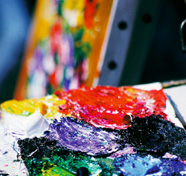 Students at Trinitas have physical education two times per week where they learn to play such games as basketball, soccer, and field hockey as well as practice other skills related to physical fitness and good sportsmanship.
Students at Trinitas have physical education two times per week where they learn to play such games as basketball, soccer, and field hockey as well as practice other skills related to physical fitness and good sportsmanship.
In addition to singing each morning during morning prayer, Trinitas students have weekly music classes where they practice choral song, are exposed to various instruments, and are taught music theory, appreciation, and history. They also have the opportunity to improvise with melody, rhythm, and movement.
All grades have weekly art classes where they are taught technique in a variety of media as well as art appreciation and art history. Student work is on display for all to admire during our annual Fine Arts Night.
Extracurricular Activities and Special Events
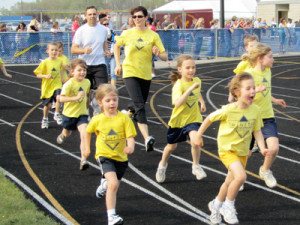 At Trinitas, students have the opportunity to participate in field trips (parents and siblings are welcome too), Spelling Bee, Speech Meet, Christmas Lessons and Carols, Grandparent/VIP Day, Fine Arts Night, Young Authors Festival, Science Fair, Trinitas Thoughtful Reader Book Club, Reader’s Theater, and more.
At Trinitas, students have the opportunity to participate in field trips (parents and siblings are welcome too), Spelling Bee, Speech Meet, Christmas Lessons and Carols, Grandparent/VIP Day, Fine Arts Night, Young Authors Festival, Science Fair, Trinitas Thoughtful Reader Book Club, Reader’s Theater, and more.
